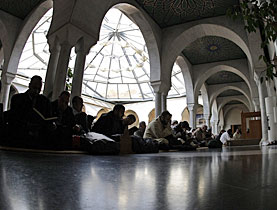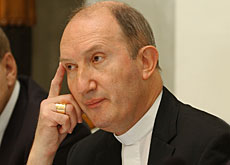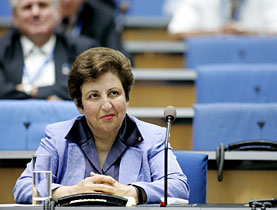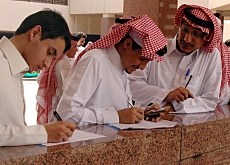“There’s no place for Sharia in Switzerland”

A Swiss professor has stirred up a hornet's nest by suggesting that certain elements of Sharia, the Muslim legal system, should be introduced in Switzerland.
Christian Giordano told swissinfo that current Swiss legislation was “too narrow” for minorities and he put a case for introducing legal pluralism.
His position echoes that of Anglican Church head, the Archbishop of Canterbury, who last year caused a storm of protest in Britain after suggesting a partial adoption of Sharia law there.
“Touching simple-mindedness” was the reaction of the NZZ am Sonntag newspaper to Giordano’s proposal, saying it wasn’t clear what problems this would solve.
“There’s no place for Sharia in Switzerland,” it said. “Special rights for people, apart from in courts of arbitration or associations, have been abolished.”
The social anthropologist, who said he wanted to generate debate on the issue, claimed he had been misunderstood. “I was calling not so much for special rights for Muslims but for legal pluralism,” he told swissinfo.
The controversy was triggered by an article Giordano wrote for the December edition of Tangram, the biannual magazine of the Federal Commission against Racism.
Legal pluralism
In it Giordano said legal pluralism was a reality in almost all ethnically and culturally diverse societies but was mostly ignored or denied “because it is perceived as a danger to social cohesion”.
Legal pluralism, he added, was more a question of introducing in some areas of the law mechanisms that took into account cultural idiosyncrasies.
“Multiculturalism is not only cultural diversity – it is politically managed cultural diversity,” the Fribourg professor explained.
“It is not sufficient to accept only the agreeable aspects of diversity like food and music.”
Social cohesion
Giordano admitted he was “inspired” by Rowan Williams, the Archbishop of Canterbury and head of the world’s 80 million Anglicans, who in February 2008 faced calls for his resignation after suggesting the British authorities would have to make some accommodation with Sharia for the sake of social cohesion.
Williams suggested there could be a “supplementary jurisdiction” in which Muslims could decide whether disputes – in which only co-religionists were involved – were resolved in secular courts or by Islamic institutions which offered an alternative forum for arbitration.
This angered people who believed in the separation of religion and state and the concept of everyone being equal before the law.
Giordano is explicit, however, that every court has to be subordinate to the state and the constitution.
“It goes without saying that the hierarchy on which the legal system is based must be respected in order to guarantee the legal validity of the constitution, which must remain secular, human rights and the basic principles of democracy,” he said.
“I am not calling for the parallel introduction of such minority laws – that is absolutely not the case. The state will always have the final word. Also, not every member of a minority is obliged to go to these courts – only people who want to go.”
Legal pluralism was certainly not a wonder cure, he added, but it was certainly a better solution than closing one’s eyes to the parallel legal systems that already existed in some European countries and which were applied without any form of state control.
Asked why the law should adapt to foreigners rather than foreigners adapting to the law, Giordano replied: “I think some people – not everybody, but some people – are embedded in their culture and I don’t think you can force them to change their identity.”
Discrimination
This argument is rejected by Elham Manea, a political scientist at Zurich University with dual Yemeni and Swiss nationality.
“It’s really presumptuous to say migrants can’t actually integrate because they’re not used to our legal tradition. I mean, why would migrants have a problem with a system that respects basic human rights and gender equality?” she told swissinfo.
Manea, a Muslim, said she also had a problem with the practice in Britain because it led to parallel societies and discriminated against women.
“When it comes specifically to divorce, compare the family law here in Switzerland with the divorce laws in Islamic tradition. In Switzerland women are treated as equals to men – both have the right to appeal and file for divorce in front of a court,” she said.
“In Islamic tradition a man has a unilateral right to divorce his wife without giving her any kind of justification. All he has to do is say the word for ‘I repudiate you’ three times.
“She has no right of appeal. If she wants to file for divorce, she has to prove harm and this is left to the judge’s discretion. Sometimes, even if she comes up with the most solid evidence, the judge thinks ‘You’re a woman – I don’t believe you’.”
“Step backwards”
“So, why on earth would we want a law that discriminates against women while we already have a law here that respects the concept of gender equality,” she said.
“It’s a step backwards and it’s a step that actually legalises the establishment of a parallel society, because according to some Islamic legal tradition a father or guardian has the right to marry off his daughter without her knowledge – and in all Islamic jurisprudence schools the agreement of the male guardian is a condition for the woman to marry. Why would you want that? It’s just not compatible with democracy, gender equality or human rights.”
Manea also drew attention to the various studies which showed that most Muslims in Switzerland didn’t have a problem with the Swiss legal system. “On the contrary, they consider it an advantage – a benefit that protects their rights.”
Giordano admitted that at present no one would vote for legal pluralism in Switzerland. “But I think the debate should be held,” he said. “Maybe in future interest will grow in the issue.”
swissinfo, Thomas Stephens
Religion in Switzerland
More than three quarters of the Swiss population are Christians – 42% are Catholic, 35% Protestant and 2.2% belong to other Christian denominations. 11.1% are not religious.
With more than 310,000 members (4.3%), Islam is the second-largest religion in the country. 12% of Muslims have a Swiss passport. They come mainly from the Balkans and Turkey.
The Jewish community has about 18,000 members (0.2%), of which 80% are Swiss.
There are 28,000 Hindus and 21,000 Buddhists.
Sharia is the legal framework based on Islamic principles of jurisprudence.
All aspects of a Muslim’s life are governed by Sharia, including politics, economics, banking, family, sexuality, hygiene and social issues.
There is no strictly static set of laws of Sharia. Sharia is more of a system of law, coming from a combination of sources including the Qur’an (the Muslim holy book), the Hadith (sayings and conduct of the prophet Muhammad) and fatwas, the rulings of Islamic scholars.
Most decisions by Sharia courts involve family and financial issues such as divorce and inheritance. But Sharia has proved controversial in the West for the extreme nature of some punishments, for example amputation of one or both hands for theft and stoning for adultery and apostasy.
Christian Giordano said he rejected any form of physical punishment.
A minaret initiative was handed in to the government in July 2008 after more than the required 100,000 signatures were collected. The text is only one sentence long: “The building of minarets is forbidden.”
The government’s response, calling on the electorate to reject it, was much longer, running to 50 pages. In essence, the cabinet argues that the prohibition of the spires, usually found outside mosques, would violate international human rights norms. It also said that a ban would hinder integration and would be ineffective in the fight against extremism.
The Swiss population will vote on the issue probably in the second half of 2009.
The country’s Muslim community says it is stunned by what it sees as an “Islamophobic” move, which it warns will undermine already fragile relations.
Both the Protestant and Catholic churches have rallied to their defence, along with most political parties, human rights experts and a number of cabinet ministers.

In compliance with the JTI standards
More: SWI swissinfo.ch certified by the Journalism Trust Initiative





You can find an overview of ongoing debates with our journalists here. Please join us!
If you want to start a conversation about a topic raised in this article or want to report factual errors, email us at english@swissinfo.ch.